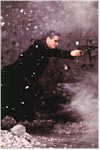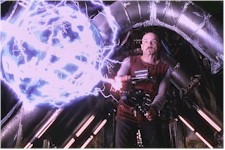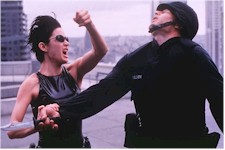|
The Matrix
review by
Carrie Gorringe,
2 April 1999
The Wachowski brothers are, if their brief bio on the The
Matrix website is to be believed (the only notation therein is some sort of mysterious
reference to a thirty-year tenure in the film business, doing Lord Knows What, before
their startling breakthrough with the slick and sassy lesbian love-triangle film, Bound),
charter members of the new generation of the Stanley Kubrick, I-Want-To-Be-Alone School of
Direction, and are a most welcome arrival, especially after the founding father made a
most untimely and unwelcome departure this past month. Like Kubrick and unlike that
remaining Garboesque director, Terrence Malick (whose style seems less that of an auteur
and more of a poseur with every passing film), Larry and Andy Wachowski appear to
possess that most elusive of skills: the ability to rework film genres, and, in so doing,
to impose their imprint upon them without destroying them utterly (though in the act of
bending things out of shape, even the best intentions can go awry sometimes).
 The act of
savoring structural elements often leaves pro-genre directors open to the charge of being
reptilian techno-junkies, more concerned with form than with substance, but this charge is
usually without substance itself. A love for form and the rules that govern it cannot
automatically be assumed to equal a narrow mindset; there are lots of so-called cinematic
"free spirits", heavily freighted with pretentious ideologies (post-’67
Godard comes immediately to mind), whose work is so narrow and hence (ironically?)
thoughtless that the filmmaker could rightfully be indicted for shooting the film through
the proverbial keyhole with both eyes open. Simply because filmmakers like Kubrick and the
Wachowski Brothers choose to make the viewer conscious of stylistic methods, there is no
reason to assume that the form is paramount; one can enjoy the construction and the end
result simultaneously. Granted, this approach is not without its own set of hazards
(notably occasional clumsiness in execution and a tendency toward self-indulgence), but a
skilled filmmaker or makers should be able to reign in most of the more egregious
violations. The act of
savoring structural elements often leaves pro-genre directors open to the charge of being
reptilian techno-junkies, more concerned with form than with substance, but this charge is
usually without substance itself. A love for form and the rules that govern it cannot
automatically be assumed to equal a narrow mindset; there are lots of so-called cinematic
"free spirits", heavily freighted with pretentious ideologies (post-’67
Godard comes immediately to mind), whose work is so narrow and hence (ironically?)
thoughtless that the filmmaker could rightfully be indicted for shooting the film through
the proverbial keyhole with both eyes open. Simply because filmmakers like Kubrick and the
Wachowski Brothers choose to make the viewer conscious of stylistic methods, there is no
reason to assume that the form is paramount; one can enjoy the construction and the end
result simultaneously. Granted, this approach is not without its own set of hazards
(notably occasional clumsiness in execution and a tendency toward self-indulgence), but a
skilled filmmaker or makers should be able to reign in most of the more egregious
violations.
Cutting back to the chase, The Matrix is the story of a nice boy named Thomas
"Neo" Anderson (Reeves) who is a day laborer in a rigidly-structured computer
company (think Electronic Data Systems under Ross Perot’s suit-and-tie-only
stewardship multiplied by a factor of two million). Two groups of people are after him,
for diametrically-different purposes: the government forces, led by the very
anal-retentive Agent Smith (Weaving), and the non-government forces, under the leadership
of Morpheus (Fishburne), a person for whom the word "arcane" would serve as an
inadequate description. Seizing Neo from the grip of Agent Smith, Morpheus and his
assistant, Trinity (Moss), take the erstwhile computer nerd on a voyage through something
called the "matrix". The matrix is a computer program which was implemented by a
government now controlled by a bunch of computers running Artificial Intelligence
programs. Of course, the takeover by the matrix has been, for the most part, stealthy (the
analogy here is somewhat akin to using a radio-controlled fence in order to keep
one’s dog within the boundaries of one’s yard, except that humanity hasn’t
become aware yet of the boundaries). The computers have decided that they are superior to
their human creators and for those who won’t accept this change in status, parricide
will be their fate. Unfortunately for the AI goons, there is one final outpost of human
resistance that must be crushed before total victory can be declared, and, for Morpheus
and his band of partisans, Neo may be the "chosen one" who can stop the
depredations of the computers. But first he has to prove that he is the "chosen
one," convince himself, and fight off the bad guys, all at once. Then there’s
the matter of whether or not the government forces have managed to infiltrate
Morpheus’s organization…
 Now, anyone who has
seen this film will attest that the above synopsis doesn’t do this film any justice
whatsoever; it is thin broth compared with the rich and highly complex narrative
bouillabaisse served up by the Chefs Wachowski. In fact, things are so complex, both
narratively and visually (in the latter department, the film contains 417
computer-generated effects, courtesy of the team led by visual effects supervisor John
Gaeta, some costing several million dollars each; without giving the game away, let’s
just say that the long-awaited promise of matching reality with concept has finally
arrived), that the average filmgoer will find him/herself dazzled into a stupor, unless
some strict observational discipline is exercised at the outset. The best advice for
potential attendees would be to enjoy the opening chase sequence, with its nearly-flawless
choreography and special effects, then hunker down and ignore everything else until the
narrative direction is clear (and, pace the protestations of several critics on
this point, the narrative line is relatively easy to grasp, if you don’t allow
yourself to get too distracted by the breathtaking effects). At that point, sitting back
and enjoying every jam-packed film morsel is in order. Now, anyone who has
seen this film will attest that the above synopsis doesn’t do this film any justice
whatsoever; it is thin broth compared with the rich and highly complex narrative
bouillabaisse served up by the Chefs Wachowski. In fact, things are so complex, both
narratively and visually (in the latter department, the film contains 417
computer-generated effects, courtesy of the team led by visual effects supervisor John
Gaeta, some costing several million dollars each; without giving the game away, let’s
just say that the long-awaited promise of matching reality with concept has finally
arrived), that the average filmgoer will find him/herself dazzled into a stupor, unless
some strict observational discipline is exercised at the outset. The best advice for
potential attendees would be to enjoy the opening chase sequence, with its nearly-flawless
choreography and special effects, then hunker down and ignore everything else until the
narrative direction is clear (and, pace the protestations of several critics on
this point, the narrative line is relatively easy to grasp, if you don’t allow
yourself to get too distracted by the breathtaking effects). At that point, sitting back
and enjoying every jam-packed film morsel is in order.
Is The Matrix really that perfect? Well, no; as stated earlier, filmmakers who
love genre film obsessively do have a tendency to run amok, and the Wachowskis are no
exception, though, mercifully, they limit their blunders to the verbiage of the first
third of the film. The concept of the matrix, as presented here, smacks a wee bit too much
of the sort of Derrida-inspired muck best left behind in Comp. Lit. 101. "What is
real?" replies Morpheus to Neo’s protestations over the grimness of the
computer-generated reality Morpheus has just shown him, "How do you define
‘real’?" With precious dialogue like this saturating the first third of the
film, it’s no wonder that the actors who have to utter it -- Reeves, Moss and
Fishburne -- look as if they would prefer to throw themselves down flights of stairs and
suffer kung-fu-inspired bruises, internal hemorrhaging and broken bones; these have to be
the less-painful alternative.  After the action kicks in, any discomfort inspired by the dialogue ends up
being submerged in the SFX ; at this point, the characters could be mouthing Sanskrit and
no one would care, or fail to understand what’s going on. In this regard, Weaving and
Foster are far more fortunate, since the quality of the dialogue is in sync with the
quality of the actors. They act as the bad and good foils, respectively, to the main
characters and, as such, have meatier roles in which they can stretch beyond the obvious.
Foster’s cameo performance as the all-seeing Oracle is an oasis of logic, humor and
is all too fleeting. Likewise, Weaving (Priscilla, Queen of the Desert) is wickedly
funny in a straight way as the evil Agent Smith (at least, that’s what he appears to
be). Watch for the sequence in which Smith gives the captive Morpheus the unvarnished
lowdown on what it’s like for a computer to live as a human being; it should inspire
more than a few discomforting chuckles, since the obvious correlation between
humanity’s existence in human flesh and a computer’s existence in the same
medium is really too close for comfort. After the action kicks in, any discomfort inspired by the dialogue ends up
being submerged in the SFX ; at this point, the characters could be mouthing Sanskrit and
no one would care, or fail to understand what’s going on. In this regard, Weaving and
Foster are far more fortunate, since the quality of the dialogue is in sync with the
quality of the actors. They act as the bad and good foils, respectively, to the main
characters and, as such, have meatier roles in which they can stretch beyond the obvious.
Foster’s cameo performance as the all-seeing Oracle is an oasis of logic, humor and
is all too fleeting. Likewise, Weaving (Priscilla, Queen of the Desert) is wickedly
funny in a straight way as the evil Agent Smith (at least, that’s what he appears to
be). Watch for the sequence in which Smith gives the captive Morpheus the unvarnished
lowdown on what it’s like for a computer to live as a human being; it should inspire
more than a few discomforting chuckles, since the obvious correlation between
humanity’s existence in human flesh and a computer’s existence in the same
medium is really too close for comfort.
Tallying up the main references thus far, the Wachowskis have borrowed from
Christianity, and Greek mythology, turned Sydney, Australia into the dystopia of the
future (updating what Godard did with 1960s Paris in Alphaville) and borrowed SFX
and visual framing from Gap commercials. What might have been an unwieldy Frankenstein
monster of self-reference actually becomes something unique and entertaining. For all of
its faults, The Matrix still has more than enough to recommend it. But remember: if you choose to snooze through the first part of the film, you’ll lose.
|
|
Written and
Directed
by:
Larry Wachowski
Andy Wachowski
Starring:
Keanu Reeves
Laurence Fishburne,
Carrie-Anne Moss
Joe Pantoliano
Hugo Weaving
Gloria Foster
Rated:
R - Restricted.
Under 17 requires
parent or adult
guardian.
FULL CREDITS
BUY
VIDEO
RENT
DVD
BUY
MOVIE POSTER |
|